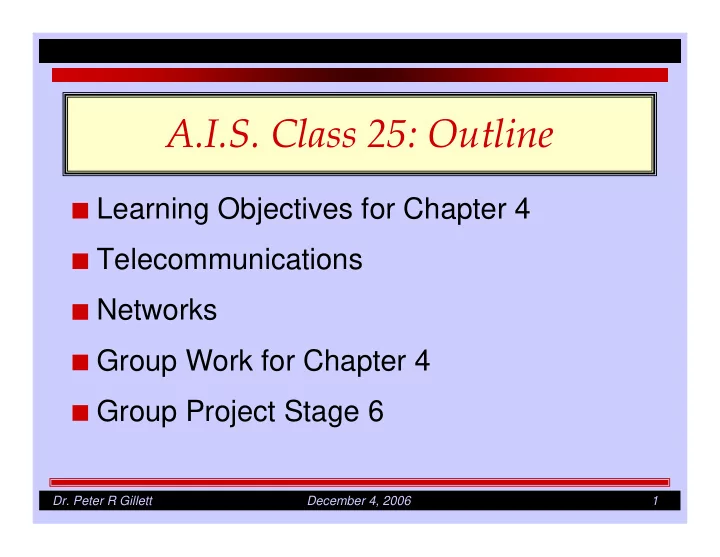

A.I.S. Class 25: Outline � Learning Objectives for Chapter 4 � Telecommunications � Networks � Group Work for Chapter 4 � Group Project Stage 6 Dr. Peter R Gillett December 4, 2006 1
Learning Objectives for Chapter 4 � After studying this chapter you should be able to: � identify the five components of a telecommunications network, � distinguish between terminals and workstations, � explain the various types of transmission links, including physical and "through the air" links, � differentiate between alternative transmission methods such as analog and digital transmission, circuit switching and packet switching, Dr. Peter R Gillett December 4, 2006 2
Learning Objectives for Chapter 4 � describe in general terms the functioning of line sharing devices and switches, � explain the role of network architecture and standards, � explain the OSI telecommunications model, � distinguish between local area networks and wide area networks, � describe alternative computer network configurations including ring, star, and bus networks, � understand the various types of wide area networks, including the options for centralized data processing networks and distributed data processing networks, � explain the concept of a client/server system, Dr. Peter R Gillett December 4, 2006 3
Learning Objectives for Chapter 4 � understand the architecture and functioning of the Internet, � distinguish between the Internet and Intranets, � describe the operation of electronic data interchange arrangements between organizations, � explain the concept of e-business and its emerging importance in the global economy. Dr. Peter R Gillett December 4, 2006 4
Telecommunications � Terminals and workstations � Transmission links � Transmission methods � Line sharing and switching � Architecture and standards Dr. Peter R Gillett December 4, 2006 5
Terminals and Workstations � Dumb terminals � Intelligent workstations � Network interface cards � Net PCs Dr. Peter R Gillett December 4, 2006 6
Transmission Links � Twisted-pair cables � Coaxial cables � Fiber optic cables � Infra-red transmission � Microwaves � Satellite transmission Dr. Peter R Gillett December 4, 2006 7
Transmission Methods � Analog � Digital � Circuit switching � Packet switching � Asynchronous � Synchronous Dr. Peter R Gillett December 4, 2006 8
Line Sharing and Switching � Multiplexers (MUX) � time � frequency � Front-end processors � Bridges � Routers � Brouters � Gateways Dr. Peter R Gillett December 4, 2006 9
Architecture and Standards � ISO’s OSI model � physical � link � network � transport � session � presentation � application Dr. Peter R Gillett December 4, 2006 10
Communication Protocols � Full Duplex (Duplex) � Half Duplex (Simplex) Dr. Peter R Gillett December 4, 2006 11
Networks � Local area networks � Network topologies � bus � token ring � star � hybrid � Novell NetWare � Windows 2003 Server Dr. Peter R Gillett December 4, 2006 12
Networks � Wide area networks � Modems � ISDN � DSL � Cable Modems Dr. Peter R Gillett December 4, 2006 13
Networks � Dedicated connections � T1 � T3 � etc. � Lines � switched � WATS � leased Dr. Peter R Gillett December 4, 2006 14
Networks � Centralized data processing � point-to-point � multidrop � multiplexed � Distributed data processing � Client-server systems Dr. Peter R Gillett December 4, 2006 15
Networks � Internet � Telnet � FTP � Usenet (News Groups) � E-mail � WWW � IRC � MUD � Intranets � Extranets Dr. Peter R Gillett December 4, 2006 16
Networks � Electronic Data Interchange (EDI) � Electronic Funds Transfer (EFT, EFTPOS) � Value Added Network (VAN) � ASC.X12 � EDI via Internet Dr. Peter R Gillett December 4, 2006 17
Electronic Commerce � Web presence � Business to consumer (B2C) � electronic retailing, banking, trading � Business to business (B2B) � e-procurement � Business to government (B2G) � Business to employees (B2E) � Individual to government Dr. Peter R Gillett December 4, 2006 18
Electronic Commerce � Issues � payment � EFT � credit cards � electronic wallets � PayPal � e-cash � security � privacy � authentication and non-repudiation � WebTrust � jurisdiction and legal issues Dr. Peter R Gillett December 4, 2006 19
XML & XBRL � SGML � HTML - format � XML - content � XBRL – financial community � XBRL � Fast, accurate searches � Drill-down � Less data re-entry � User choice for disclosure Dr. Peter R Gillett December 4, 2006 20
XML Documents � Hierarchical � Self-describing � Directly usable over the Internet � Do not replace HTML � Standards promulgated by W3C � Convert to HTML, spreadsheet, etc. via XSLT � XML Schema – a new standard for defining consistent structure Dr. Peter R Gillett December 4, 2006 21
XBRL � XML-based taxonomy � Common business semantics � Variable output format � Currently: � Financial reporting taxonomies � General ledger taxonomies � Promulgated by XBRL International, created by AICPA, www.XBRL.org � Specification 2.1 issued December 2003 (revised November 2004, 2005) Dr. Peter R Gillett December 4, 2006 22
Group Work for Chapter 4 � Discussion Questions � Problems 1 & 2 Dr. Peter R Gillett December 4, 2006 23
Group Project Stage 6 � Presentation Dr. Peter R Gillett December 4, 2006 24
Recommend
More recommend